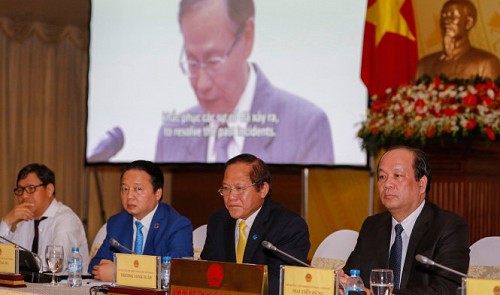While many believe the US$500 million a Taiwanese firm has proposed as compensation for an environmental disaster caused by one of its subsidiaries in Vietnam is modest, it may be just enough to spare it from a criminal charge.
Government officials held a meeting on Thursday to announce that toxic leakage from the Vietnamese steel plant of Taiwan’s Formosa Plastics Group was the cause of the fish death epidemic in central Vietnam between April and May.
Pledging US$500 million in compensation to ‘fix’ their wrongdoings, alongside an apology to the Vietnamese government and people, leaders of the Hung Nghiep Formosa Ha Tinh Steel Co. Ltd. admitted that its untreated wastewater was behind the pollution that littered miles of coastline in Ha Tinh, Quang Binh, Quang Tri, and Thua Thien-Hue with dead fish.
After publicizing the information regarding Formosa’s role, Environment Minister Tran Hong Ha and Minister Mai Tien Dung, head of the Government Office, fielded questions from the press regarding the scandal.
Asked about the $500 million in damages promised by Formosa, Minister Ha responded that “the compensation is still too small,” as it is calculated only on direct material damages and does not take other bigger consequences into account, such as psychological damage to the fishermen whose businesses were completely put on hold.
Minister Dung also noted in the meeting that whether or not Formosa is handed criminal charges still remains under consideration.
“Formosa has admitted its fault and pledged a five-point commitment,” Dung said.
“We should remember the old saying: you shouldn’t hit a man when he’s down.”
100 scientists worked to find the cause
In his statements to the press, the environment minister gave a more detailed account of the Formosa steel mill’s role in the mass fish kill.
According to the government, the inspection to find the cause of the disaster was conducted by more than 100 scientists whose results were later questioned by international experts to ensure objectiveness and accuracy.
“The scientists first conducted a geographical study on the affected sea areas, collecting sediment samples and testing them at different international labs,” Minister Ha said.
The final test results, evaluated by independent international scientists, show that a mixture of phenol, cyanide and ferric hydroxide was formed beneath the sea and poisoned marine life to die en masse.
“We knew that toxicity that killed the fish. The next question was where it came from. We then reviewed hundreds of facilities along the coastline and eventually focused on three suspects: the Formosa steel mill, the Vung Ang thermal-power plant, and the Ha Tinh Industrial Park,” the minister said.
Ha said an energy audit found that there were five days when the steel plant had abnormal power consumption, while the facility itself was found to have loose management over experimentation and an inadequate wastewater treatment system.
“We concluded that the furnace of the steel mill had leaked phenol and cyanide into the ocean,” Ha said.
“Presented with legal evidence, Formosa, their scientists, and their lawyers had to admit their fault.”
Five-point commitment
After admitting its link to the fish deaths, Formosa made a five-point commitment to correct its wrongdoings and resolve its environmental impacts.
The company first publicly apologized to the Vietnamese government and people for causing severe environmental pollution, along with a pledge of VND11.5 trillion, or US$500 million in total compensation. The money will be used to support fishermen in finding new work and to purify the polluted water.
The third commitment is that Formosa will improve its technology and ensure that wastewater is completely treated before being discharged into the environment.
Formosa also promises to cooperate with relevant Vietnamese agencies to build a set of sustainable solutions for preventing pollution and avoid further environmental catastrophe.
The Taiwanese firm finally guarantees a fulfillment of the above commitments; otherwise, it will bow to any penalties presented by the Vietnamese.
Speaking at the Thursday’s meeting, Vietnamese Prime Minister Nguyen Xuan Phuc requested that Formosa fulfill its commitments properly, especially the compensation.
How the fish kill happened
In early April, dead fish started washing ashore at the beaches in Ha Tinh Province, especially the area near the Vung Ang Economic Zone – the site of the Formosa steel plant. The phenomenon disaster quickly spread to nearby provinces, including Quang Tri and Quang Binh.
On April 20, at the Binh An beach in Thua Thien-Hue Province, locals found the coastline covered in dead fish, marking the epidemic’s arrival in the province.
In late April, Deputy Minister of Science and Technology Pham Cong Tac confirmed that all tests and analysts had found that temperature shock or disease could be ruled out.
On May 1, Prime Minister Phuc visited Ha Tinh, insisting that the cause behind the fish deaths be found. “The people need a scientific and specific conclusion to this case,” the premier underlined.
On May 9, PM Phuc signed a directive to provide urgent support for fishermen in the four affected provinces.
On May 29, local media reported that the fish deaths, whose reasons were then unknown, had discouraged local consumers from eating fish and seafood, affecting traders not only in central Vietnam but also in Ho Chi Minh City.
On June 2, the government held a press meeting to announce that the cause behind the deaths had been identified, but it was being challenged by experts in order to ensure it was based on scientific, legal, and objective grounds before a final conclusion was confirmed.

























































